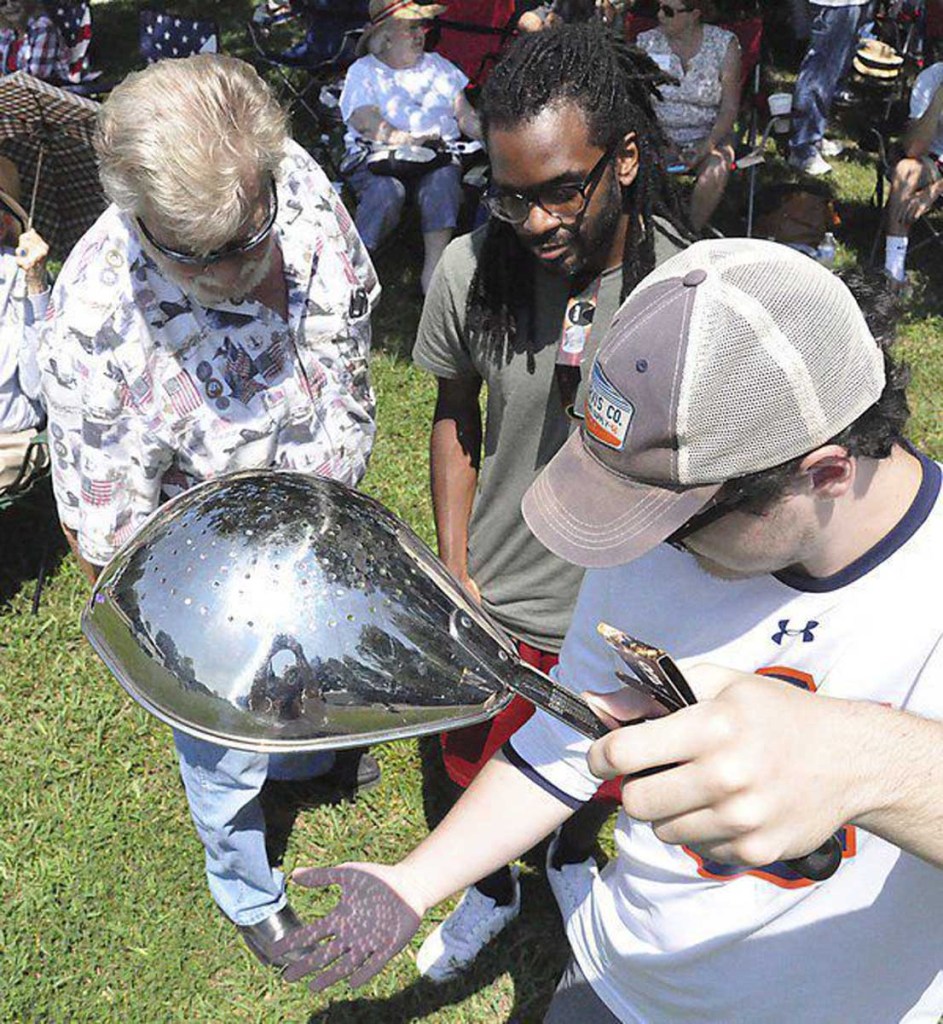College leads group to ‘perfect’ eclipse experience
Published 1:50 pm Tuesday, August 22, 2017

- Tyler Flegle, right, a student at Auburn University, uses a colander to project the light from the eclipse onto his hand.
ENGLEWOOD, Tenn. — First it was the cicadas who announced the coming of the eclipse with their chirping that usually punctuates the dusk on a hot summer evening.
Instead, it was mid-afternoon here in east Tennessee in the path of the total eclipse, but the insects were easily fooled as the humans lifted their eyes to the heavens.
Trending
For many on the trip here sponsored by Dalton State College, reactions were intense. Their eyes were turned up as the sky grew darker as the moon crossed in front of the sun. There was a dimming of the light and the appearance of stars, then they broke out in applause when a ring of light hung high above them. For the more than two-and-a-half minutes of total eclipse, they stared safely at the sun. Some marveled and wept, taking the eclipse for a more symbolic part of their faith.
“Oh, that was fantastic! Worth every minute,” Anne Blaylock said to DSC Director of Marketing and Communications Pam Partain as the sun began to regain its power as the moon moved out from in front of it. “I can cross that off my bucket list. Everything came together perfectly.”
Indeed, for the 110 people who came on chartered buses and the nearly 40 more students and staff who came on school transportation, and others who drove north on Highway 411, it was a perfect setting with clear spaces, some shady trees and an accommodating city.
The trip was the brainchild of Partain, who jokingly said she just wanted to figure out a way to see the total eclipse without having to take a day off of work.
“It has turned out to be perfect — a perfect experience,” Partain said. “As much as we could have seen in Dalton, 100 percent totality is just nothing like 99 percent. It is one of the most incredible and awesome natural phenomena you can witness.”
This is the second total eclipse for Partain, who witnessed a total eclipse at the age of 12 in 1970.
Trending
“It is just awesome to experience,” she said. “To hear the cicadas, and to see the stars and to see the day getting darker like a time-lapse photo, it is incredible. And the people of Englewood have been incredible.”
Englewood was chosen by DSC Dean of Science, Technology and Mathematics Randall Griffus. Griffus said he has a cabin north of Englewood and has been here many times for other events. The venue was a park running along the railroad tracks that bisect the town.
DSC President Margaret Venable said as a former chemistry teacher she was used to having students take her courses merely to fulfill their lower-level science requirements. Venable said she has been glad the college and the local schools have been able to use the eclipse as a teaching tool.
“One of the things as a chemist is seeing the local students and the college students developing a deeper appreciation for science and appreciating this opportunity for what it is — a once-in-a-lifetime event,” she said.
Venable said when Partain approached her about making the trip to the path of totality, she was all for it, but worried there wouldn’t be enough interest.
“I didn’t know if we were going to have enough people to fill a bus,” Venable said. “By noon the next day, we already had 12 on a waiting list and had to get another bus. What a great problem to have!”
Patsy Gordon was one of the people who read about the trip in the paper and contacted the college.
“I signed up immediately,” Gordon said. “I was just going to hang out at my home and watch it in the backyard, but when I read about this trip I was ready. It has been fabulous and beyond fun. So many people on this trip are educated and you can learn something. I love to learn things.”
“And I have just had a lot of fun,” she said. “I was pretty impressed when I saw the Eiffel Tower for the first time, but this has that beat.”
Both Venable and Griffus said they hope to have more community “science projects” — so to speak — in the future with the new observatory owned by the college being a prime teaching tool.
“The college, hopefully, can do more things like this, especially with the observatory as a centerpiece,” Venable said. “I like to think of it as one of the perks of having a college in our community is that it truly is the community’s college.”





